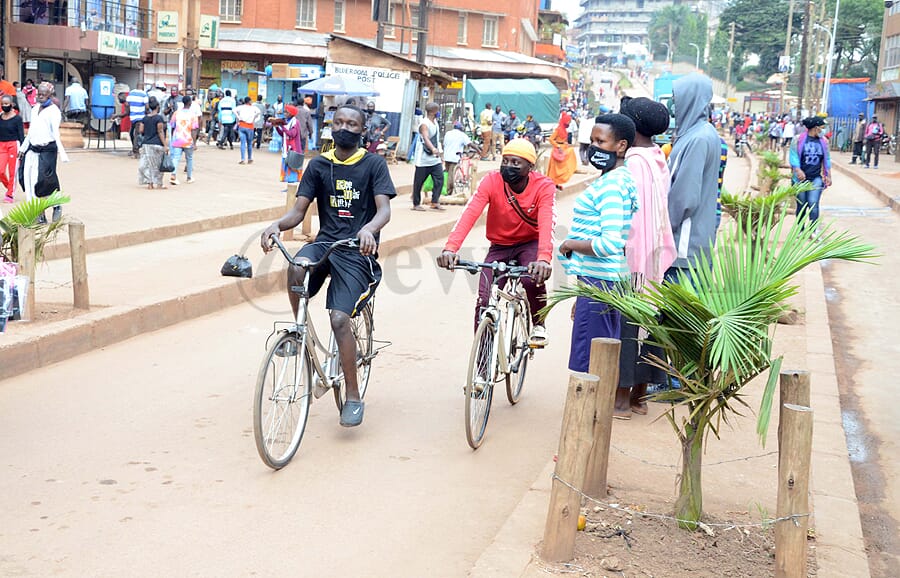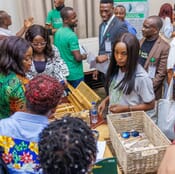Circularity, circular economy and sustainability are all that are leading conversations in recent times. These concepts have been identified as the business of opportunity of the 21st century to help achieve the 17 Sustainable Development Goals by the United Nations. These goals alongside the need to rescue people and the planet from climate change have spiked the Clarion call to embrace the production and consumption of products and services that not only serve humans but save the planet.
One such eco-friendly way of living to encourage a sustainable planet is cycling. Cycling has been spotted as an eco means of transportation since it produces zero gas emissions and does not rely on fossil fuels or gas to run. Also, cycling is noiseless, promotes cleaner air, can abate traffic situations, reduces the cost of transportation and enhances health and well-being. Research from Oxford University revealed that choosing cycling over driving a car can reduce an average individual’s transportation emissions by 67 per cent. In 2021, the Intergovernmental Panel on Climate Change also identified bicycling as an antidote to improving a sustainable planet. Cycling has been identified as an effective means to help cities net zero as it wields the potential to save 6 to 14 million tons of CO2.
Aside from mitigating climate change and improving the environment, a World Health Organisation publication highlighted that safe cycling can contribute to shaping health. According to the report, walking or cycling for 20 minutes reduces mortality risk by 10 per cent; cardiovascular disease by 10 per cent; type 2 diabetes risk by 30 per cent and cancer-related mortality by 30 per cent.
Amid soaring fuel gas costs for vehicles, developed cities such as France, Amsterdan, Utrecht, Munster, Copenhagen etc have adopted cycling as a respite to clamp down on the financial burden of fuel or gas and the carbon / green gas emissions from fossil fuel-powered vehicles. This trajectory of cycling not just as a recreational but as a means of transportation is worthy of advocacy in a mega city such as Lagos, Nigeria. However, the puzzling question is if the state is adequate to glean from this eco-friendly means of transportation that can soothe the ravages of high-cost fuel prices and incessant traffic experience in the state.
A cycling enthusiast, coach and ambassador in Amuwo-Odofin, Lagos, Mr Dare Daniel who is the founder of Biking and Cycling Enterprise with up to twenty-five years’ experience in the field spoke on the potential that cycling has for Lagos if adopted as a means of transportation. He stressed that he has a burning passion that cannot be quenched by anyone for cycling and biking. Mr Dare shared in this enriching conversation shared his affiliation with the Lagos State Cycling Association since 2009 and the Lagos Metropolitan Area Transport Authority (LAMATA) has made laudable efforts to create advocacy on encouraging Lagosians to adopt cycling both as a leisure activity and a means of transportation but these efforts have been in the coma and stifled due to the peculiarities in Lagos State. He vehemently stated that Lagos environment is not conducive for cycling as a means of transportation However, he remains optimistic that providing the right cycling infrastructure coupled with the current burden of costly transportation in Lagos, may spring up conversations and actions to possibly adopt cycling as a means of transportation. Read his conversation with one of the CEIP staff,
What effective strategies can encourage individuals to incorporate cycling into their daily commute?
Two things are involved in cycling, it is either used as a means of transportation or a very necessary exercise equipment. That’s the two strategies I found that necessitate every individual to embrace cycling. Take, for example, the popular delivery organisation, Glovo, which started using bicycles for deliveries. For guys who want to work for them, it’s a matter of necessity for them to get on their bikes because Glovo gives them a condition that they must be skilled in cycling and own a bicycle to make deliveries and get paid. Secondly, it becomes a necessity for someone who realises that he or she is becoming obese or probably has issues with the cardiovascular system and then resorts to cycling to improve their health status. A lot of us just decide that we cannot stress ourselves because of the risks in cycling but I tell you cycling is effective in maintaining body fitness. Cycling consists of three categories of sports: jogging, walking and running.
Do you consider cycling feasible as a means of transportation in Lagos state?
Cycling on its own has the answer for this question while Lagos state on its own has an answer too. Cycling is valuable as a means of transportation but Lagos state as an environment for cycling as a means of transportation is not conducive. I can sustain cycling till this very moment because I just have to put up the ideology of the fact that everything is possible. If I look at the discouragement in Lagos state by the motorists, all forms of insults, confrontations and accusations we experience on the road every day, I may have abandoned this career. The last time I trained my boys from the Amuwo-Odofin bridge down to the Shagamu diversion in Ogun State. our experience on the road was awful and crazy. a lot of people said positive things which were on the minimal but negative remarks were on the maximum. A friend of mine decided to push further in making cycling a means of transportation by bringing in an electric motorised bike. It is motorised by coil propelling force on the battery. Maybe it gives a lot of cyclists confidence that it is faster and it’s not just about self-energy. That one a lot of people are buying into it but it’s not for everybody it’s only for the rich.
Cycling is the perfect picture of the means of transportation we need in Lagos including other cities in Nigeria, but there is no infrastructure for cycling and that is a sole big risk for the cyclist.
What are the barriers that make cycling not feasible as a means of transportation in Lagos state?
No infrastructure is the principal barrier while the other barrier that is facing cycling in Lagos state is insecurity. I have done my research in other countries where they use cycling as part of their means of transportation and I realised that they have a lock rack for every bicycle location. For instance, maybe you’re going to catch up with the train and then you have to ride from one from your residence to the train station. When you get to the train station you just have to put your bicycle on the rack and lock it. it’s part of the infrastructure that would have made a provision for the security. I still tell my clients after beautifying your bicycle with a lock feature, even if they lock it to a pole it can’t be further than 10 metres away from it, or else it will be broken from the pole the bicycle and made away with.
Then if there will be any third barrier, it’s the interception of the bike guys like the motorbike commonly known as okada riders. This is because there’s no provision for cycle lanes. There could be interceptions of bike guys and walkway passersby to intercept bicycle riders. Based on my experience in Lagos you realise that when these bicycle or bike lanes are created for bicycles, amid gridlock the motorists will tend to face that same lane made for cycling bicycles only. If you check the Festac bicycle lanes right now, what do you find there? shops for aboki selling sweets, you find out that the tree planting along the avenues has obstructed some of the bike lanes. Car dealers have made some of those places their sample space for car stands, and some of the cycle lanes have been covered with gutter drainage overflow, heaped sands etc.
A lot of things have happened to it which has not made Festac a successful location for cycling in Amuwo-Odofin. How much more the entire city?
What solutions do you proffer to the challenges you highlighted?
I will speak precisely about Lagos. The solution to these challenges is- to create the infrastructure, create the preventive measures to protect the infrastructure and thirdly place security agencies to prevent lawbreakers on the infrastructure. These are the means to encourage a massive amount of cycling even within six months. When someone knows that I can cycle from Amuwo-Odofin to CMS through the bicycle lanes without being obstructed by the policemen, the Kick Against Indiscipline (KAI) agency and the Lagos State Traffic Management Authority (LASTMA) everybody will be very much encouraged to ride down to their office. The principal problem of everybody is I don’t want to kill myself young. If these solutions are provided, Lagosian cycling as a means of transportation will prosper 100 per cent in Lagos.
Cycling can only survive when you have the support of government figures when you have the support of private individuals and companies. If these three forces, and then together with a cycling enthusiast, then it becomes a success story.
Also cycling skills need to be developed. From ratio 1 to 10. Let me say, from the time I started, I can say it was not up to 1. But now, eyes are opening to it and then I can rate it as 5, hence cycling is developing.
Can you share any success stories of individuals who have successfully transitioned to using cycling as their primary mode of transportation?
I remember somebody came to my shop and requested for the bicycle to be designed for a short-distance utility ride. I had to install baskets with some covers and a carrier at the back for minor shopping and sometimes use it for leisure rides or exercise. Nobody has come to me and said he wants to learn how to ride for transportation because even as a beginner you need a couple of six months to one year to ride within your community before you can gain the confidence to hit the major route for utility. I have not had experience with somebody who wants to learn how to ride for transportation but I have had people who want to buy and design a bicycle for that purpose.
What advice would you give to employers or businesses looking to incentivize cycling among their employees or customers?
One of the very first encouragements is that cycling is cost-efficient because alone your transport costs from your house to your workplace are costly. Again, it creates a health balance and then it is eco-friendly. I can categorically tell you with facts and evidence that ever since I have been cycling, I record 10 to 15 years of not breaking down., I can’t remember the last time I was admitted in the last 30 years. Cycling has a lot of significance on our health. It saves us the cost of transport. It saves us the cost of medication. It even does not require you to eat heavily before you cycle because you definitely gas out when you want to cycle in the morning. You do not need anything more than tea and bread or pap. Then you can get to your office, you can take more solid food, definitely before you close from work and go back, that must have been digested. Then all you need going back home is just a bottle of water to revive your energy while you’re riding because you’ll be burning it while you’re riding. Also, bicycles could be used for more than 10 to 20 purposes. It can be used differently based on how you operate your gear selections. You can ride a bicycle for 10 hours without sweating continuously.
How do you collaborate with local authorities, urban planners and others to advocate for better cycling infrastructure or policies?
Years ago, I was invited by the Lagos Metropolitan Area Transport Authority (LAMATA), led by Bloomberg Initiatives, which indicated that it wanted to develop cycling infrastructures in 21 cities in Africa. The letter got to the Festac town residence association president and he forwarded it to me to represent the Amuwo Odofin local government. The Bloomberg initiative decided to donate one millionaire for that and LAMATA called all the representatives of cycling in each local government and we all discussed the beautiful ideas and the beautiful initiative, the barriers, the obstructions and the possible means by which it could be realistic and that was it. It was in that meeting we started it that was where it ended. We never heard anything about it. Assuming that particular initiative came to reality cycling would have gone a long way in silencing a lot of means of transportation in Lagos state. Since 2009 I have been the head coach of Amuwo-Odofin while since 2011 I have been functioning with the Lagos State Cycling Association and in 2017 I partnered with some University of Lagos (UNILAG) students in collaboration with Heinrich Boll-Stiftung, a non -non-governmental organisation. They were the ones who came to do the feasibility study of bicycle lanes in Festac. Again, before that, in 2012 I led the Amuwo-Odofin team down to Lagos State Sports Festival under the administration of Comrade Ayodele Adewale as we came back first we came back first winning five gold seven silver eight bronze. I created cycling awareness for Honourable Dipo Olounrinu during his office as Lagos State House of Assembly representing Amuwo-Odofin Constituency 1 between 2015 to 2019. I also did the same for him during his election campaign for the second tenure of Governor Babajide Sanwo-Olu as the then-Lagos state Governor. That created a massive movement for cycling awareness. There was also a time I attempted a programme called Tourism to Ghana, from Lagos to Ghana but it failed due to lack of support. I also teach schools in Festac up till today to encourage children and adults both to fulfil their extra school curriculum or for competitive reasons. From the competitive aspect, the type of cycling we practise here in Africa is just not more than six activities in cycling and it all depends on how you operate your function. We have individual time trials; two-man team pursuit; four-man team pursuit; point race, road race and sprint riding.
How do you tailor your programme to support beginners and those who may be apprehensive about using cycling as a mode of transportation
I take my time to do a lot of brainstorming as regards cycling to make it to wave my discouragement and give attention to my encouragement. All efforts put together to set up a cycling community have always faced challenges. People have always perceived that the road is not good for cycling. I started to brainstorm on how I can provide a solution to this particular problem and I just came up with a proposal on Estate Management on Bicycle Fixing and Cycling Training Development. This proposal is because I realised parents do not want their kids to cycle outside their compound. The parents, including adults, fear that cycling in the estate may expose them to running into cars, motorists, etc. hence, I developed the Estate Management on Bicycle Fixing and Cycling Training Development. My plan is if I get consent from these children’s parents I will bring them together from their different estates and with that I have created a community for cycling. In that cycling community I can train the ones that do not know how to ride, I can build passion in someone who started riding it for leisure to take it up as a career as well as the one that can choose it as a lifestyle. I know of a lady always kitted ready to cycle everywhere you see her. She uses cycling as a means of transport for any purpose but I’m trying to bring her into the spotlight so that she can do something more effective. The plan is cost-efficient and eases the stress of distance movements for cycling purposes. I am also professional towards my approach to training. I just give instructions and interpret it on the bicycle. I do not use the local method where you have physical contact with your client which may lead to compromise especially with female customers.
What role do you see technology playing in promoting cycling as a transportation solution?
Technology has helped in innovation in bicycles and bikes. There are many categories of bicycles ranging from a professional racing sport bicycle, a double suspension bike, mountain bikes, bicycle motocross, stunt bikes etc. We have three materials for bicycle production now and that’s how their prices are being ranked. We have iron materials, aluminium materials and carbon fibre-made bicycles. In Nigeria for us who are dealers, the minimum cost of a bicycle is eighty thousand Naira, and the maximum has no limit
Then again, in terms of technology, Nigeria is lagging because we do not even produce bicycles, most of the bicycles here are imported. We rely heavily on importation.100% importation. Every effort, even for me, has been nipped! There was a bicycle I designed for massaging big tummies. I designed it to have a pad that vibrates and then massages the lap. The pads will be on the lap for the stomach and it’s meant for only sport bicycles; those bicycles that have their hands curved to the ground. so when you ride, it massages your stomach with the vibrating pads. I designed it but when I saw no means to develop it, I suspended it because even if I construct the metallic parts how do I get the pad vibrating by electric?
Aside from the manufacturing technology could help in services such as bicycle sharing, ordering bicycle rides, renting bicycles etc. However, the first thing to do on any bicycle or bike for these purposes is to fix a tracker. In ordering, the customers are to give a description of the type of bicycle needed and then provide answers to some important questions such as What’s the purpose of your order? Where do you want to ride it to? What’s the distance from your house to your office? What is your body weight? because somebody who is 90 kg or 110 kg will need a double-suspension bike. I also engage in renting bicycles’ but it is solely physical. I rent to individuals, church groups or organisations who want to cycle on a particular weekend to keep fit as well as to the movie and music industries to shoot their production.
For partnership on cycling, kindly contact Mr Dare Daniel on 08030794320
Interviewed by Genevieve Aningo for Circular Economy Innovation Partnership (CEIP)




